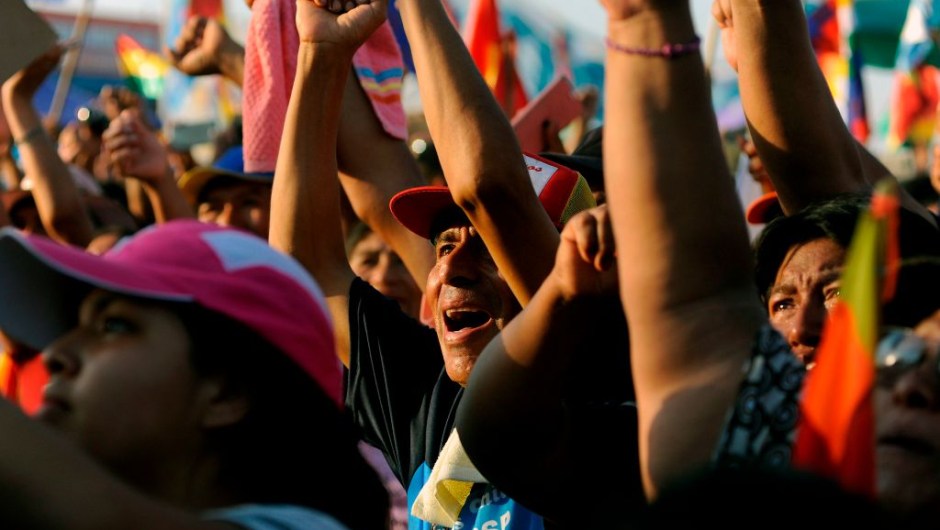Editor's Note: Pedro Brieger is an Argentine journalist and sociologist, author of several books on international issues and contributor to publications in different countries. He is a professor of Sociology at the University of Buenos Aires (UBA). Director of Nodal, a portal dedicated to news from Latin America and the Caribbean. He is a TV columnist on the Argentine channel C5N and on the program En la Frontera on PúblicoTV (Spain) and on programs on the Argentine radio stations Radio10, La Red, La Tribu and LT9-Santa Fe. Throughout his career, Brieger has He won important awards for his informative work on Argentine radio and television. His Twitter account is @PedroBriegerOk. The opinions expressed in this column belong exclusively to the author. See more opinion articles at CNNe.com/opinion.
(CNN Spanish) - This July 13, the presidential candidate Luis Fernando Camacho sent a letter to the Secretary General of the Organization of American States, Luis Almagro, to speak out and help postpone the elections scheduled for September 6 in the Plurinational State of Bolivia.
Eight months after the coup that overthrew President Evo Morales, uncertainty reigns in Bolivia, a country where today clear rules are conspicuous by their absence. And while several political formations are preparing for the elections, they want to prevent them from taking place. It sounds weird. Why? Because I think they fear losing them. This is clearly seen in the letter in which Camacho's party asks that they be postponed since, among other things, the electoral apparatus would continue to be managed by Evo Morales from Buenos Aires.
Surely, those who promoted the overthrow of Morales miss the "classic" coups of the twentieth century in which the military seized power, loosely spoke of democracy, kept the ballot boxes, banned parties and unions, persecuted opponents, placed their people in the key places and they managed the State at will. And boy, does Bolivia know about this, since it holds the record of 189 blows since its independence in 1825, not including last year's.
Something has changed in Latin America and the blows no longer follow the pattern of yesteryear. It is worth remembering that in Paraguay Fernando Lugo was overthrown in March 2012 by a parliamentary coup d'état and 5 years later he assumed the presidency of Congress. He currently works as a senator and shares the premises with several of those who removed him in 2012.
There is also the case of Dilma Rousseff in Brazil, who just two years after her dismissal was able to present herself as a senatorial candidate.
This did not happen in the 20th century. The deposed presidents ended up in prison or in long, very long exiles, like that of Juan Domingo Perón. Perón was overthrown by a coup in September 1955 in Argentina, he went into exile and his movement was persecuted and proscribed. He was even forbidden to speak his name, and the media referred to him as "the runaway tyrant." It took a long time to rebuild Peronism due to successive proscriptions and he returned to his country 18 years later.
The “problem” of those who encouraged the overthrow of Evo Morales is that his movement, the Movement to Socialism (MAS), is still the main political force, it has a majority in Congress, some polls give it a first-round winner, and it is united behind the candidacy of Luis Arce, who was Evo Morales' Minister of Economy.
On the contrary, the forces that promoted the overthrow of Morales are divided, with several candidates fighting for the same public and fighting among themselves because - among other reasons - they criticize the de facto president Jeanine Añez, who had said that she would not appear. as a candidate. Until she launched her candidacy.
- LOOK: Jeanine Áñez, isolated after testing positive for coronavirus while improving her health
Although it is true that the pandemic has affected Bolivia in a very particular way, including the contagion of the de facto president, her chancellor and several ministers, it is no less true that elections have already been held in different countries during the pandemic; among others, the presidential elections in the Dominican Republic on July 5.
The so-called "civic movement" that groups social organizations that always faced Evo Morales, announced that he will not accept any election in September imposed by "the dictator from Argentina" to "save democracy," in his own words.
Those who overthrew Evo Morales in Bolivia must long for other times and they will say to themselves "blows were the old ones."
Evo Morales, Jeanine Áñez

